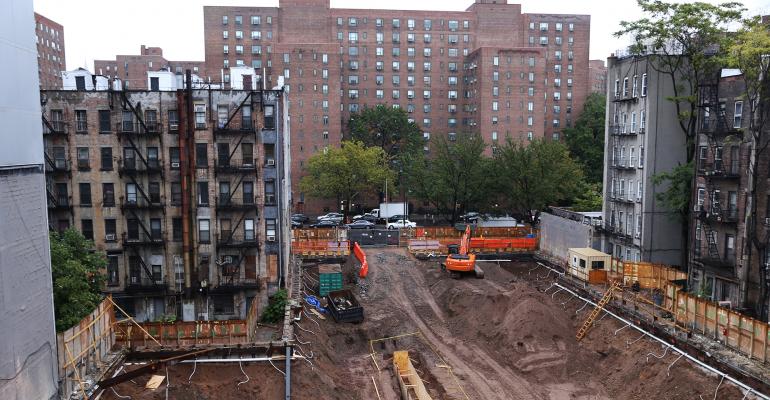Real estate development often has received a bad rap—in many cases justified—for leading to gentrification and displacement of residents. Projects that are often wildly successful at delivering returns end up fundamentally transforming communities rather than uplifting them.
Former New York City Deputy Mayor Alicia Glen has launched a platform aimed at changing that. Called MSquared, Glen, who will serve as founder and managing principal, says the company will operate at the intersection of real estate and social impact investing. The goal is to create projects that improve communities by creating mixed-income housing that enables people like teachers, nurses and first responders to be able to live in the communities they serve. It will also tenant projects with local businesses that can create opportunities for locals.
The projects will serve what Glen calls “the missing middle,” as traditional practices have led to a “barbell” distortion of the market with cities stratified largely between rich and poor neighborhoods. Projects will be regulated to ensure that the housing remains affordable for essential workers.
The economic and social impacts of COVID-19 along with the nationwide protests and activism confronting racism have only underscored the need for this kind of platform, Glen says.
“The company will work with local governments, developers and investors to build projects that incorporate a mix of uses designed to promote inclusive economic growth, affordable housing for a wide range of rent-burdened residents, and dedicated spaces for small business owners and community institutions,” according to a press release. “Approaching mixed-income and mixed-use development as additive to our social infrastructure will help address the fear and isolation felt by many in the current environment by creating connected communities that incorporate housing, food access, jobs, and healthcare.”
Aside from serving as deputy mayor, Glen also previously served as Head of Goldman Sachs’ Urban Investment Group (UIG). Glen is joined by Carolee Fink, a principal at MSquared, and a growing team of real estate and economic development professionals. Fink most recently served as chief of staff in the deputy mayor’s office. While at City Hall, Glen and Fink oversaw more than 20 agencies, departments and authorities with over 25,000 employees and a $30 billion capital budget.
Glen’s work included oversight of the development and financing of more than 125,000 affordable homes in New York City. She also initiated large-scale planning efforts at Sunnyside Yards and Governors Island, launched NYC Ferry, spearheaded the rezoning of the Garment District and East Midtown, negotiated financing for the Union Square Tech Hub and expansion of Google’s campus, and repositioned the City’s industrial assets to support modern manufacturing and film and TV production. At Goldman Sachs, Glen was involved with more than $5 billion of mixed-use development in cities across the country.
NREI sat down with Glen to discuss the initiative as well as what it means to bring impact investment to the world of commercial real estate.
This interview has been edited for length, style and clarity.
NREI: You’re positioning MSquared to be “at the intersection of real estate and social impact investing.” Social impact investing is not a concept that comes up often in commercial real estate. Can you talk about what that means?
 Alicia Glen: I think you hit the nail on the head. Real estate investing is a very mature industry and asset class. Impact investing is a relatively new phenomenon. It’s grown out of the ESG work that’s increasingly part of investment portfolios.
Alicia Glen: I think you hit the nail on the head. Real estate investing is a very mature industry and asset class. Impact investing is a relatively new phenomenon. It’s grown out of the ESG work that’s increasingly part of investment portfolios.
It’s a direct strategy with an aim for solid returns and specific, non-financial impacts… For example, finding ways to reduce water waste or help young women in Africa go to school. You see a lot of it in the green space. But it’s fair to say there’s very little thought in real estate capital allocation to social impacts.
The goal is to take all my real estate finance experience and all my experience in the affordable space and fund great projects that have strong returns and measurable impacts. That means producing housing for people like teachers, nurses and first responders. It’s creating spaces and places for community organizations. And bringing in retailers to hire people. It’s to build projects that are sustainable and eco-friendly and projects that contribute to the overall fabric of the neighborhood.
NREI: Are there existing projects that you can point to that are good examples of the kinds of things you are talking about?
Alicia Glen: There are projects that I financed running the Urban Investment Group (UIG) at Goldman. That was the first place combining real estate investment and impact investing. There are also projects I worked on as deputy mayor.
Essex Crossing is a large-scale mixed-use project in the Lower East Side. I started working on that project at UIG and continued to work on it as deputy mayor. It’s a public/private partnership. It’s a smart intersection of real estate investment and social impact investing. There are a lot of different levels of affordable housing to it—for seniors, for families. There are amenities there that serve not just the people in lower Manhattan, but the city as a whole. It created a whole bunch of jobs. It brought a movie theater to a neighborhood where there hadn’t been one for years.
So it’s about creating communities that are truly diverse and allow workers to stay in their communities. For artists, writers, social workers, teachers, etc., living in some parts of cities has become increasingly hard. In real estate people are always going to try and build to the height of that market. We want to combine strong markets—where there are opportunities to drive value—but also combine it with some of the other public goals to build stronger projects and stronger cities.
NREI: Are there particular cities that you’ve identified for the kinds of investments you are talking about?
Alicia Glen: We are national in scope. But even a really good investor or developer can’t cover everything. You need to understand the local market—the regulatory market, the politics. Some cities are really experiencing affordability crises. The middle class is getting squeezed out.
We’re looking at cities with strong population and job growth, but not enough housing supply. But it also has to be cities, counties and areas that are really interested in solving the problem.
Cities that are rapidly changing are places like Denver, Charlotte, N.C., Austin, Texas., Nashville, Tenn. Cities that used to be considered affordable are now unaffordable.
You’ve got to start doing something about it before you end up in a situation like the Bay Area where the whole character of the city is changing because of a lack of affordability.
We’re working on a project in Newark, N.J., that’s 50 percent market rate and 50 percent affordable and also will feature great retail and a day care on site.
NREI: To achieve some of these goals how does that affect the investment and leasing process compared to a more traditional development?
Alicia Glen: Capital needs to be a little more patient. There are strong returns, but you’re also making a real difference. If there’s one thing we’ve learned lately it’s that we are all inter-dependent. Our seniors need to be able to get healthcare in their neighborhood. Teachers and nurses need to be able to afford to live in the communities they serve. Law enforcement needs to be part of the community.
In terms of the leasing and tenanting process—that’s a real difference. We are committed to it when we build the building. Part of the building is reserved for the “missing middle” and when we enter into the agreement with the city and county, we make sure those units are leased out to those people. And it’s not just about setting rents at that level. It’s entering into an agreement to make sure that if you have 20 units for teachers that you make sure if one moves out, another moves in.
A lot of projects may be affordable, but they are not regulated. And that just means you’re not solving the real problem. Just setting the rent low doesn’t do it.
NREI: So how do you market it? How do you make sure, for example, teachers know about the project and the availabilities?
Alicia Glen: Teacher’s Village in Newark is a good example. That was a partnership with the local school board and with Teach for America. Teach for America signed a master lease for units so that its teaching fellows could live in downtown Newark. So, it’s mechanisms like that where you make sure the units could be for teachers.
We’re looking at a deal in Charlotte where the city would be responsible for auditing us to make sure we’re leasing to middle-income residents. We’d have an obligation under a regulatory agreement. So, it varies, but a lot of it is marketing, partnerships, local community groups, etc.
We are a women-run company that would like to invest with developers that are also women- or minority-owned. That’s also a huge win. And then we’d like to layer on it to work with cool new companies or local retailers.
If you make the effort to reach out to the great entrepreneurs and retailers in the community and bring those people instead of national chains, it says a lot about your project and who are you. You also drive better long-term value. It’s riskier. These are not credit tenants. And you might need to re-tenant if they don’t survive. But generally these kind of investments and light industrial really pay off. It drives better rents and it’s better for the market as a whole.
Most people hate developers and hate the buildings brought into neighborhoods. We need to change that narrative. We want the narrative to be about the lady who sold the best tacos from a truck getting a space to grow. That changes the dynamic.
NREI: The release also mentions transit-oriented developments (TODs). Can you talk about why those appeal to you?
Alicia Glen: TODs strongly contribute to the longer-term sustainability goals of getting people out of their cars. That’s a real impact in and of itself. The other thing is it contributes to affordability, because you don’t have to have a car. You can make life more affordable by using mass transit. And from an environmental point of view, I’d be surprised if we did any project that wasn’t tied to mass transit in some way.
NREI: What’s the reception in the market from investors for what you’re trying to do?
Alicia Glen: It’s a hard time to be out raising money. It’s a little like ‘How crazy do you have to be to build a company in the middle of a pandemic?’ But we have a bunch of projects that we are working on and we are raising capital project by project. And I think the reality is you have to wait for the fall or the end of the year to see to what extent it’s possible to do a more traditional raise.
Ultimately, we’re looking to raise around $300 million, which we could leverage up to $1 billion. If we can raise more, we can build out the business faster. But that’s the target right now.

